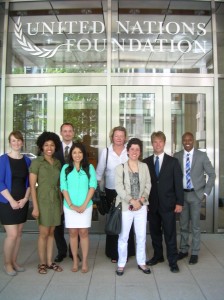
International Economic Development Law students outside the UN Foundation, one of their stops during a four-day excursion to Washington, are (from left) Pamela Szelung, Akemi Malone, Steven Bison, Cintya Larios-Guzman, Adjunct Professor Sabine Schlemmer-Schulte, Allison Mintz, Michael Duhn and Marcus Mason.
Students in the International Economic Development Law course gained new perspectives when Adjunct Professor Sabine Schlemmer-Schulte arranged meetings in Washington with top representatives of major international institutions, non-profits and US government agencies.
Schlemmer-Schulte, a Fellow at the British Institute of International and Comparative Law, has taught the class since 2000, but this was the first time she added the field trip to the class. The course is part of the curriculum for the LL.M. in International Business and Trade Law Program. Staff in the Center for International Law helped Schlemmer-Schulte make this trip a reality.
“Professor Schlemmer-Schulte was so informative and really made the trip a great learning experience! She is an exquisite scholar and brought a lot of information to the table regarding the various agencies and the economic landscape in general,” said Pamela Szelung (J.D. ’14), an LL.M. student.
During the four-day visit in early June, the students were in morning and afternoon meetings with presenters at World Bank Group; the International Monetary Fund; Office of the U.S. Trade Representative; Freedom House, the non-profit promoting freedom and democracy in young nations; the Inter-American Development Bank; the U.S. branch of Transparency International; Millennium Challenge Corp., a bilateral U.S. foreign aid agency; the Center for Global Development; and the UN Foundation.
The field trip for the eight students provided a unique opportunity for the students to meet with policymakers and others in government and the private sector. Through their meetings, the students got a better understanding of the many issues underlying the intersection of trade, finance and development.
“Being part of such a small group allowed us to ask questions openly and have a dynamic discussion of the issues that each agency was particularly concerned about,” Szelung said. “Each agency that we visited had such a distinct mission from the other agencies that we never heard the same information twice.”
“I found connecting academia with this field experience was worth every penny,” said third-year Allison Mintz. “Programs like this give you the good, the bad and the reality of a career in this field” through presentations given by experienced experts, as well as the professor and fellow students.
Overall, the summer semester course set out to review international calls for global economic development and public and private efforts to meet those calls. Within the context of the North-South debate, students consider the approaches to international contracting and regulation of foreign involvement in economic development sectors, as well as development initiatives in the International Monetary Fund, the World Bank, and the General Agreement on Tariffs and Trade and the World Trade Organization (GATT/WTO).
